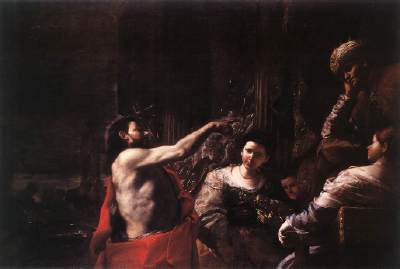Who was Herod Antipas?
A one-dimensional villain from Central Casting, twirling the waxed end of a black mustachio? A serial lecher? A murderer? An enemy of all that was good and right? Someone easy to hate?
Or was he more like...Tony Soprano? Or me? Or you?
Herod was a fellow who, like many of us, was squeezed between the demands of his job and the demands of his family. As Tetrarch -- a local bigshot whose family was allowed by the Roman Empire to stay in power as long as it acknowledged and deferred to the real power behind the throne -- he lived with the knowledge that he ruled solely at the pleasure of Rome. Getting along by going along was what had kept the house of Herod going for years. And this clan, like many privileged clans before and since, had its share of intrigues, conflicts and dirty family linen collecting in dark corners as it sought to consolidate and preserve what power it had.
The Gospel lesson today tells us that Herod liked John the Baptist; enjoyed hearing him preach. Perhaps there was something in John's stark simplicity of life and word, in his call to repentance and renewal and an authentic life, that resonated with a man caught in interpersonal messiness, decadence, endless capitulations to the powers and principalities. My pastor notes that most people whose lives are in a mess know their lives are in a mess; that it's a mistake to assume that they don't. Something in John's message evidently appealed to Herod...so much so that he put John under what some scholars view as a kind of protective custody when his new wife Herodias grew resentful of John's no-holds-barred assessment of their relationship. (Which was probably as much or more about family "bidness" than lust.)
But when push came to shove...Herod's "no" to God overcame his "yes." Because he was a people-pleaser. Because he was vain. Because he was afraid; afraid of his "friends" and associates, afraid of his family. He made a stupid, drunken public oath that, in his culture, he was honor-bound to keep; but at some point he could have elevated rationality and human decency above his own need to save face. His evil was a banal evil indeed: evil borne in passivity, the evil of the middle manager and good-time Charlie and "whipped" partner.
How often are our thoughts and actions controlled by the same dynamics? Looking good; fitting in; fear of feeling or appearing foolish; fear of making other people mad at us; grasping at whatever crumbs of power or status fall our way; inertia in making positive, transformative changes in our lives because the alternative is easier and safer.
The temptation, in reading this story, is to identify with John the Baptist, when in fact if we're honest with ourselves we're more like Herod. That's the bad news.
The good news is that God still reaches out to us in friendship and forgiveness and invites us into a new way of relating to God and a new way of being in the world. Herod's "no" to God's friendship, which meant an untimely death not only for John the Baptist but also for Jesus, God With Us, was not enough to make God withdraw the offer. No matter what a tangled web we weave as fallen people caught in situations and systems tainted by our fallenness, God's "yes" is greater than our "no," and God's saving arm is longer and stronger then our grasp on those things that keep us alienated from God. The Herod we meet in the Gospels didn't seem to be able to trust in God's saving power in his own situation. But Jesus, the One who goes before us and shows us the way, has shown us by his own experience that we can trust in God's love and saving power, even when our circumstances suggest otherwise. Thanks be to God!
"John the Baptist Before Herod," Mattia Prettist


No comments:
Post a Comment